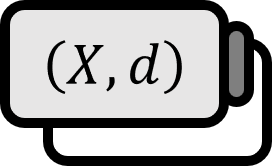Closed Subsets of Compact Sets in Metric Spaces are Compact
Theorem1
In a metric space $X$, a closed (relative to $X$) subset of a compact set $K$ is compact.
Proof
Given a metric space $X$ where $F\subset K \subset X$ and assuming $F$ is a closed set in $X$ and $K$ is a compact set. Let $\left\{ V_{\alpha}\right\}$ be an arbitrary open cover of $F$. By adding $F^{c}$, let’s denote it as $\Omega=\left\{ V_\alpha \right\}\cup \left\{ F^{c} \right\}$. Then $\Omega$ becomes an open cover of $K$. Assuming that $K$ is compact, then there exists some finite subcover $\Phi$ of $\Omega$ such that:
$$ F \subset K\subset \Phi $$
Let’s consider two cases.
case 1. $F^{c} \notin \Phi$
Then $\Phi$ is a finite subcover of $\left\{ V_{\alpha} \right\}$, so $F$ is compact.
case 2. $F^{c} \in \Phi$
If we set $\Psi=\Omega \setminus \left\{ F^{c} \right\}$ then since $F^{c}\cap F=\varnothing$, it still holds that $F\subset \Psi$. Therefore $\Psi$ is a finite subset of $\left\{ V_{\alpha} \right\}$, making $F$ compact.
■
Corollary
In a metric space $X$, suppose $F$ is closed and $K$ is compact. Then $F\cap K$ is compact.
Proof
$F \cap K$ is a closed set as it is the intersection of closed sets. Thus, as a closed subset of the compact set $K$, it is compact.
■
Walter Rudin, Principles of Mathmatical Analysis (3rd Edition, 1976), p37-38 ↩︎
